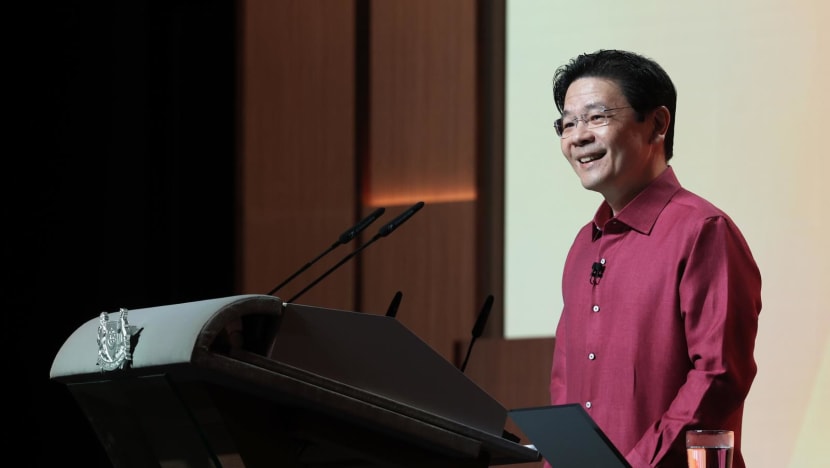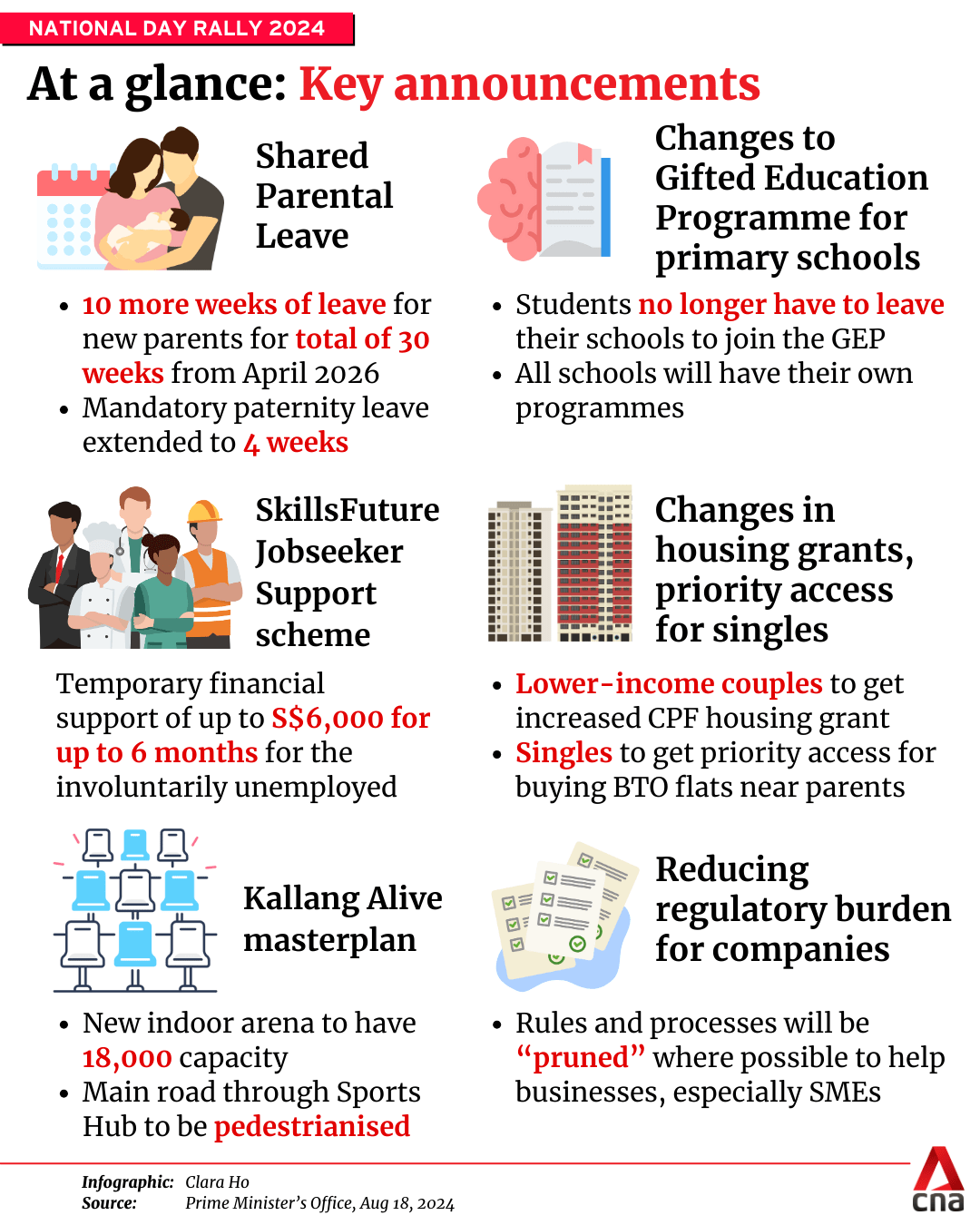PM Wong makes 'radical' policy shifts in maiden National Day Rally: Analysts
Prime Minister Lawrence Wong shared experiences from his personal life in his maiden National Day Rally, an approach which would resonate with a younger generation of Singaporeans born mostly after independence, said political observers.

Prime Minister Lawrence Wong delivers his first National Day Rally. (Photo: MDDI)

This audio is generated by an AI tool.
SINGAPORE: In his first National Day Rally, Prime Minister Lawrence Wong made significant and radical policy announcements, taking further steps towards a renewed social compact promised in the Forward Singapore exercise, said political observers.
Mr Wong, who took office as Singapore’s fourth leader on May 15 this year, delivered the rally on Sunday (Aug 18). The National Day Rally is seen as the most important political speech of the year.
Observers added that Mr Wong came across as relatable by sharing experiences from his personal life, an approach which would resonate with a younger generation of Singaporeans born mostly after independence.
“It was less of him talking to you as the PM, than him talking to you as a fellow citizen,” said Dr Leong Chan-Hoong, senior fellow and head of the social cohesion research programme at the S Rajaratnam School of International Studies.
“At various points in his speech, he was being more relatable, especially the part where he said he turned out okay although he attended a neighbourhood school. The younger generation will find it more relatable.”
Dr Teo Kay Key, a research fellow at the Institute of Policy Studies, added that the speech also served to help Singaporeans know the new Prime Minister even better.
A “major reset” in Singapore’s policies and attitudes – that was how Prime Minister Lawrence Wong described the road ahead for the country in his first National Day Rally speech.
Among the key initiatives announced on Sunday (Aug 18) was a financial aid scheme for retrenched workers.
Parents of newborns will get an extra 10 weeks of shared leave, and singles will be included in a scheme that gives priority to people applying for new public flats near their parents.
TAKING SINGAPORE FORWARD
Observers said the tone and direction of Mr Wong’s speech was in line with the Forward Singapore movement, in which the government seeks to create a new social compact to take the country forward amid a changing global environment.
“It does show the effort in trying to reshape policies to ‘refresh’ and ‘recalibrate’ the social compact,” said Dr Teo Kay Key, a research fellow at the Institute of Policy Studies.
She said that while the objectives of the policies have not changed, the proposed plans are now significantly different.
“I think besides paternity leave – which has been increased previously and thus is not as unexpected – the other changes are more radical in nature because they are moving away from how the original policies are structured,” she said.
On Sunday, Mr Wong announced various changes, such as housing benefits for singles and a new scheme to help those unemployed.

“The key highlight of tonight is really the message of a more egalitarian approach to managing Singapore's policies,” said Dr Leong.
“For example, you talk about allowing the GEP (Gifted Education Programme) to be made available to all schools. That is a very strong message on what we can expect, which are policies to redistribute the resources to a wider population of Singaporeans. This includes also the public housing in the city centre, that are traditionally only available to the more well-to-do.”
Singapore Management University’s assistant professor of political science Nathan Peng told CNA the broad themes of Mr Wong’s speech were “distinctly aligned” with those brought up in the Forward SG report released last October.
“Questions like how to ensure every Singaporean had a chance to make it with hard work featured prominently, reflecting a continuance of past commitments to ensure social mobility by fighting social and economic inequality,” he said.
Associate Professor Daniel Goh, associate provost for undergraduate education at the National University of Singapore and a former Non-constituency Member of Parliament, said the policies sought to foster inclusive growth, continuing a trajectory set by Senior Minister Lee Hsien Loong when he was Prime Minister and President Tharman Shanmugaratnam when he was in Cabinet.
A DIFFERENT GENERATION
Dr Leong noted that Mr Wong’s approach was “groundbreaking” in its own way, compared to his predecessor Mr Lee.
Back in his first National Day Rally in 2004, Mr Lee touched on sacred cows such as introducing a five-day work week and introducing the idea of casinos in Singapore.
“I think it's about reaching out to a different generation of Singaporeans. When then-PM Lee delivered his first NDR, back then you still had a sizeable population who were born before independence. I think the dynamics were quite different to the crowd that PM Wong is reaching out to,” he said.
“The distinctive part is to understand it's about a new social compact, and tonight we saw the crystallisation of the dialogue in various policies that Singaporeans can connect to, like housing and education.”
Dr Goh noted that Mr Lee was responding to key issues of his time, such as the threat of a stagnating economy after the Asian Financial Crisis and SARS.
Mr Wong is now squarely dealing with hardening social mobility and the threat of protracted elitism and durable inequality, with most of Sunday’s announcements targeted at these issues, said Dr Goh.
BOLD MOVES IN POLICIES
One policy in particular which stood out for observers was the move to create a SkillsFuture Jobseeker Support Scheme, to help lower- and middle-income workers who have lost their jobs.
Dr Leong noted that it is “a major shift of direction”, recognising that even the white-collar university-educated workforce may face concerns about the loss of jobs.
“In this day and age, having a job is beyond just about financial compensation, it's also about a form of recognition and dignity and is entrenched in Singapore culture. The financial assistance is not a lot compared to what you get in a full-time job, but it is important.”
Independent political observer Felix Tan, who has written about Singapore’s electoral and political landscape, called it a surprising move as it is “a shift away from the government’s strict ‘no welfare state’ concept”.
“However, I would also caution against thinking that this would necessarily mean that Singapore is a ‘welfare state’. The financial support schemes for those who have lost their jobs do come with conditions. Therefore, it is not like many developed Western countries where the state provides for its people, come what may,” he said.
Dr Goh noted that the scheme is being placed under the SkillsFuture banner, as it is critical for the monetary support payout of S$6,000 over six months to be complemented by incentives to retrain and reskill.


















